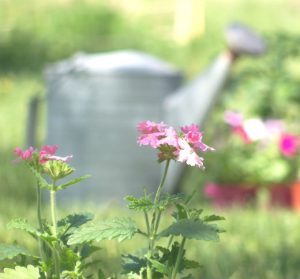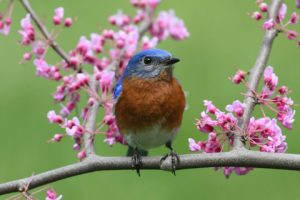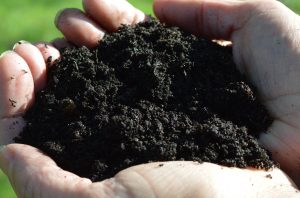Whether you have a flower, vegetable, or herb garden, research is showing profound benefits we receive when working in and enjoying our gardens.
 Studies show that gardening provides a sense of fascination. It was observed that while people did basic garden activities from tilling to cutting flowers or harvesting vegetables, they also indulged in other garden activities such as admiring their garden and observing the natural world around them. This improved depression significantly. The degree of fascination was the strongest predictor of depression improvement. “Engendering fascination can help short-circuit depression’s debilitating cycle of rumination – the negative thoughts that seem to run on a continuous loop.” (Selhub & Logan, 2012, pg. 155). Working in the garden seems to have a way of activating specific brain pathways, while it disengages rumination.
Studies show that gardening provides a sense of fascination. It was observed that while people did basic garden activities from tilling to cutting flowers or harvesting vegetables, they also indulged in other garden activities such as admiring their garden and observing the natural world around them. This improved depression significantly. The degree of fascination was the strongest predictor of depression improvement. “Engendering fascination can help short-circuit depression’s debilitating cycle of rumination – the negative thoughts that seem to run on a continuous loop.” (Selhub & Logan, 2012, pg. 155). Working in the garden seems to have a way of activating specific brain pathways, while it disengages rumination.
Stress Recovery
If you garden, you probably already notice how working in your garden helps you feel better after a stressful situation. In a study published in the Journal of Environmental and Public Health, the stress-relieving effects of gardening were tested. Gardening not only lowered salivary cortisol levels, positive mood was also fully restored. Reading was also observed in this study which showed reading did help lower cortisol levels in the recovery period, but decreases were significantly stronger from gardening. While the positive mood of the gardeners was fully restored after gardening, they further deteriorated during reading.
Exercise
Exercise is one of the best ways to help with stress, and this may be one of the many ways why gardening is so beneficial. As they explain in Your Brain on Nature, studies have shown that gardening can be significant exercise. Just thirty minutes of setting up, planting, and watering a flower bed was found to be the metabolic equivalent of non-game basketball playing. It was also stated that gardening is a physical activity that promotes a sense of contentment and calm, while at the same time increasing energy levels. In a study published in the American Journal of Public Health, both men and women taking care of a community garden tended to have lower body weight than their siblings and neighbors who didn’t.
Sounds in the garden
 The sounds surrounding you in your garden may also be another way that gardening helps with stress. Exciting research is showing that listening to the sounds of nature has an amazing ability to help the body recover from stress. If you stop and focus on the sounds of nature around you, you may notice sounds that you normally don’t pay attention to like birds, frogs, crickets, and the wind blowing through the leaves. Visit the Sounds of a Summer Daydream post for 20 minutes of beautiful sounds of nature.
The sounds surrounding you in your garden may also be another way that gardening helps with stress. Exciting research is showing that listening to the sounds of nature has an amazing ability to help the body recover from stress. If you stop and focus on the sounds of nature around you, you may notice sounds that you normally don’t pay attention to like birds, frogs, crickets, and the wind blowing through the leaves. Visit the Sounds of a Summer Daydream post for 20 minutes of beautiful sounds of nature.
Beauty of soil
 The soil that we till, plant our seeds in and also pull those pesky weeds from not only helps our plants be happy and healthy, it also helps our health and happiness. The health benefits of Lactobacillus bulgaricus bacteria found in yogurt are well known. In 1909, over 100 years ago, scientists found that this bacteria is found naturally in soil and that it would be fairly simple for gardeners to come into contact with the bacteria while tilling.
The soil that we till, plant our seeds in and also pull those pesky weeds from not only helps our plants be happy and healthy, it also helps our health and happiness. The health benefits of Lactobacillus bulgaricus bacteria found in yogurt are well known. In 1909, over 100 years ago, scientists found that this bacteria is found naturally in soil and that it would be fairly simple for gardeners to come into contact with the bacteria while tilling.
It has been observed for a century that health and soil bacteria are connected. These probiotics have been shown to reduce body-wide inflammation, decrease anxiety and improve cognitive functioning. Exciting animal studies show that when given these bacteria while under stress, the stress hormone levels in the brain are reduced, while also affecting the mood and fear regulating neurotransmitters in the brain. The studies also show brain levels of Omega-3 fatty acids levels and blood levels of tryptophan levels are both increased. This could be another explanation of improved mood while gardening as tryptophan is vital for the manufacturer of serotonin in the brain.
Lactobacillus and Bifodobaceria aren’t the only beneficial bacteria found in soil. Mycobacterium vaccae is another bacteria commonly inhaled or ingested while gardening and in nature. This bacteria has been shown to boost mood as well as the immune system. Research shows that animals exposed to Mycobacterium vaccae produced more serotonin.
Garden your way
You don’t need a large area to have a garden. Gardens can be grown in small spaces, as well as in containers, and many cities have community gardens where you can have your own garden space. As they showed in the study of community gardeners, it doesn’t take a large garden to reap the benefits from gardening.
References:
If you are interested in the health benefits of living close to nature, I encourage you to read Your Brain on Nature and The Nature Principal.
Alvarsson, J.J., Wiens, S., Nilsson, M.E. (2010). Stress recovery during exposure to nature sounds and environmental noise. International Journal of Environmental Research and Public Health, 7, 1036-1046.
Annerstedt, M., Johnsson, P., Wallergard, M., Johansson, G., Karlson, B., Grahn, P., Hansen, A.M., Wahrborg, P. (2013). Inducing physiological stress recovery with sounds of nature in a virtual reality forest. Physiology and Behavior, 118, 240-50.
Ganzalez, M.T. (2010). Therapeutic horticulture in clinical depression: A prospective study of active components. J Adv Nurs, 66, 2002-13.
Kaplan, R. (1973). Some psychological benefits of gardening, Environmental Behavior, 5, 145-62.
Kweon, H., Matsuo, E., Choi, J., Ogaki, T. and Shibuya, K. (2004). Exercise intensity of horticulture as physical activity. Actua Hort. (ISHS), 639, 277-280.
Logan, A. (2003). Chronic fatigue syndrome: Lactic acid bacteria may be of therapeutic value. Med. Hypotheses, 60, 533-38.
Lowry, C.A., Hollis, H.H., Lightman, S.O. (2007). Identification of an immune-responsive mesolimbocortical serotenergic system: Potential role in regulation of emotional behavior. Neuroscience, 146(2-5), 756-772.
Louv, R., (2011). The Nature Principle: Human Restoration and the End of Nature-Deficit Disorder, Chapel Hill, NC: Algonquin Books of Chapel Hill
Norman, H.J. (1910). Lactic acid bacteria in the treatment of melancholia. Br Med. Journal, 1, 1234-35.
Selhub, E.M. MD. & Logan, A.C. ND. (2012). Your Brain on Nature (pp. 151-166). Ontario, Canada: HarperCollins Publishers Ltd.
Van Den Berg, A.E., Custers M.H. (2011). Gardening promotes neuroendocrine and effective restoration from stress. Journal of Environmental and Public Health, 16(1), 3-11.
Zick, C.D., Smith, K.R., Kowaleski-Jones, L., Uno, C., Merrill, B.J. (2013). Harvesting more than vegetables: the potential weight control benefits of community gardening. American Journal of Public Health, 103(6), 1110-5.
